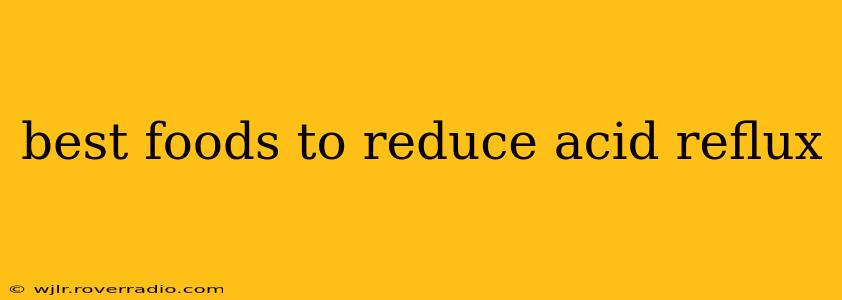Acid reflux, also known as gastroesophageal reflux disease (GERD), is a common condition characterized by stomach acid flowing back into the esophagus. This backflow can cause heartburn, a burning sensation in the chest. While medication can help manage acid reflux, dietary changes can significantly reduce symptoms. This guide explores the best foods to eat and avoid to alleviate acid reflux naturally.
What are the best foods to reduce acid reflux?
Many foods can help neutralize stomach acid or prevent its reflux into the esophagus. Focusing on a diet rich in these foods can significantly improve your symptoms.
-
Low-fat dairy products: Plain yogurt, low-fat milk, and cheese (in moderation) can be surprisingly helpful. The calcium in dairy products can help neutralize stomach acid. However, high-fat dairy can worsen reflux, so moderation is key.
-
Lean meats: Chicken, turkey, and fish are excellent choices. These protein sources are generally low in fat and don't trigger acid reflux as frequently as fatty meats.
-
Oatmeal: This fiber-rich breakfast option is gentle on the digestive system and can help promote satiety, reducing the likelihood of overeating, which can contribute to acid reflux.
-
Fruits (low-acid varieties): Bananas, melons (cantaloupe, watermelon), and berries (in moderation) are generally well-tolerated. Avoid citrus fruits like oranges, grapefruits, and lemons, as these are high in acid.
-
Vegetables (most): Most vegetables are good choices. Steamed or boiled vegetables are easier to digest than raw ones. However, some high-acid vegetables like tomatoes and onions may trigger reflux in some individuals.
What foods should I avoid if I have acid reflux?
Knowing which foods to avoid is just as important as knowing which ones to eat. These foods often relax the lower esophageal sphincter (LES), allowing stomach acid to escape.
-
Fatty and fried foods: These foods take longer to digest and can increase pressure in the abdomen, exacerbating reflux.
-
Chocolate: Chocolate contains methylxanthines, which can relax the LES.
-
Coffee and caffeinated beverages: Caffeine can stimulate acid production and relax the LES.
-
Spicy foods: Spicy foods irritate the esophageal lining, worsening heartburn.
-
Alcohol: Alcohol can relax the LES and increase acid production.
-
Citrus fruits: Oranges, grapefruits, and lemons are high in citric acid, which can irritate the esophagus.
-
Tomatoes and tomato-based products: Tomatoes are acidic and can worsen reflux symptoms.
-
Mint: Mint can relax the LES, leading to acid reflux.
What other lifestyle changes can help reduce acid reflux?
Dietary changes are crucial, but they aren't the only factors. Incorporating these lifestyle adjustments can make a significant difference:
-
Maintain a healthy weight: Obesity increases abdominal pressure, worsening reflux.
-
Eat smaller, more frequent meals: This reduces the pressure on your stomach.
-
Avoid eating late at night: Give your body ample time to digest before lying down.
-
Elevate your head: Use extra pillows to keep your upper body elevated while sleeping.
-
Quit smoking: Smoking weakens the LES.
How long does it take to see improvement with dietary changes for acid reflux?
The time it takes to notice improvement varies from person to person. Some individuals see a significant reduction in symptoms within a few days of making dietary changes, while others may need a few weeks. Consistency is key, so stick to your new eating habits to see the best results.
Can I cure acid reflux by changing my diet?
While a carefully chosen diet can significantly manage and reduce acid reflux symptoms for many people, it's not a cure. Acid reflux is often a chronic condition requiring ongoing management. Dietary changes form a vital part of this management but may not eliminate the condition entirely. Consult with your doctor for a proper diagnosis and personalized treatment plan.
Are there any specific tests to diagnose acid reflux?
Diagnosing acid reflux often involves a combination of methods, including a thorough review of your symptoms and medical history. Your doctor might also recommend tests like an endoscopy (to visually examine your esophagus) or pH monitoring (to measure the acidity levels in your esophagus).
This information is for general knowledge and does not constitute medical advice. Always consult your doctor or a registered dietitian for personalized advice regarding your diet and the management of acid reflux.
